Owner of Kesseler Hove Sean Carter explains how he breaks away from most kitchen retailing conventions, including using a supplier’s brand name for his business
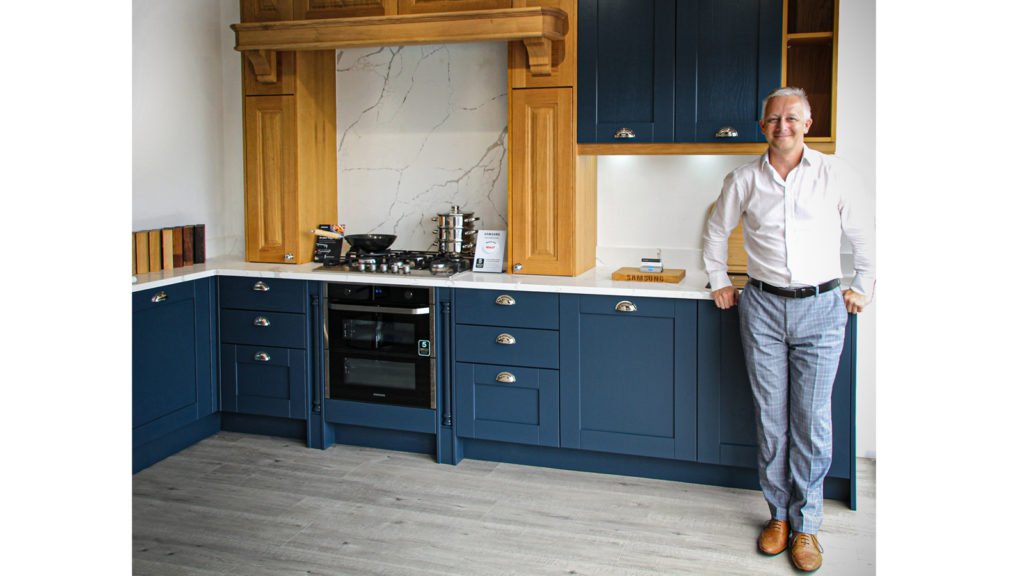
During his 30-year career in kitchen sales, Sean Carter hasn’t been restricted by convention.
It started with his first job in the industry, when he was working for B&Q. “You couldn’t work for them until you were 26 but I was just 18. When they saw my sales figures they chose to ignore my age.
Sponsored Video
“As far as I am aware, I was the youngest sales person in the country of kitchens.”
And Sean has continued to plough his own field, most recently opening his own retail business, using the brand name of a supplier, and within just four months of finding the showroom: “It took six weeks to refurbish it. If you’ve motivated [it can be done].
“I had seven guys working here and I was here every day, cleaning the site at the end of each day.”
He admits it happened quickly but adds: “I make my mind up quickly on everything. I’m not one of these people that sit and think about it because by the time you have spent thinking about it, you’ve missed all the opportunities.”
“Finding a showroom was half the problem”, exclaims Sean. But knowing the up-and-coming Hangleton area of Brighton & Hove helped limit the location of his search.
With a razor-sharp focus on having a property with parking but not on the high street “as you have a lot of people come in and walk around but they’re not serious “, when the property became available, it was a no-brainer for Sean to take the lease.
He then started an immediate search for suppliers. “I went to see Kesseler – and from that point on, it was decision made. It was a snap decision but Kesseler offered me what I wanted.”
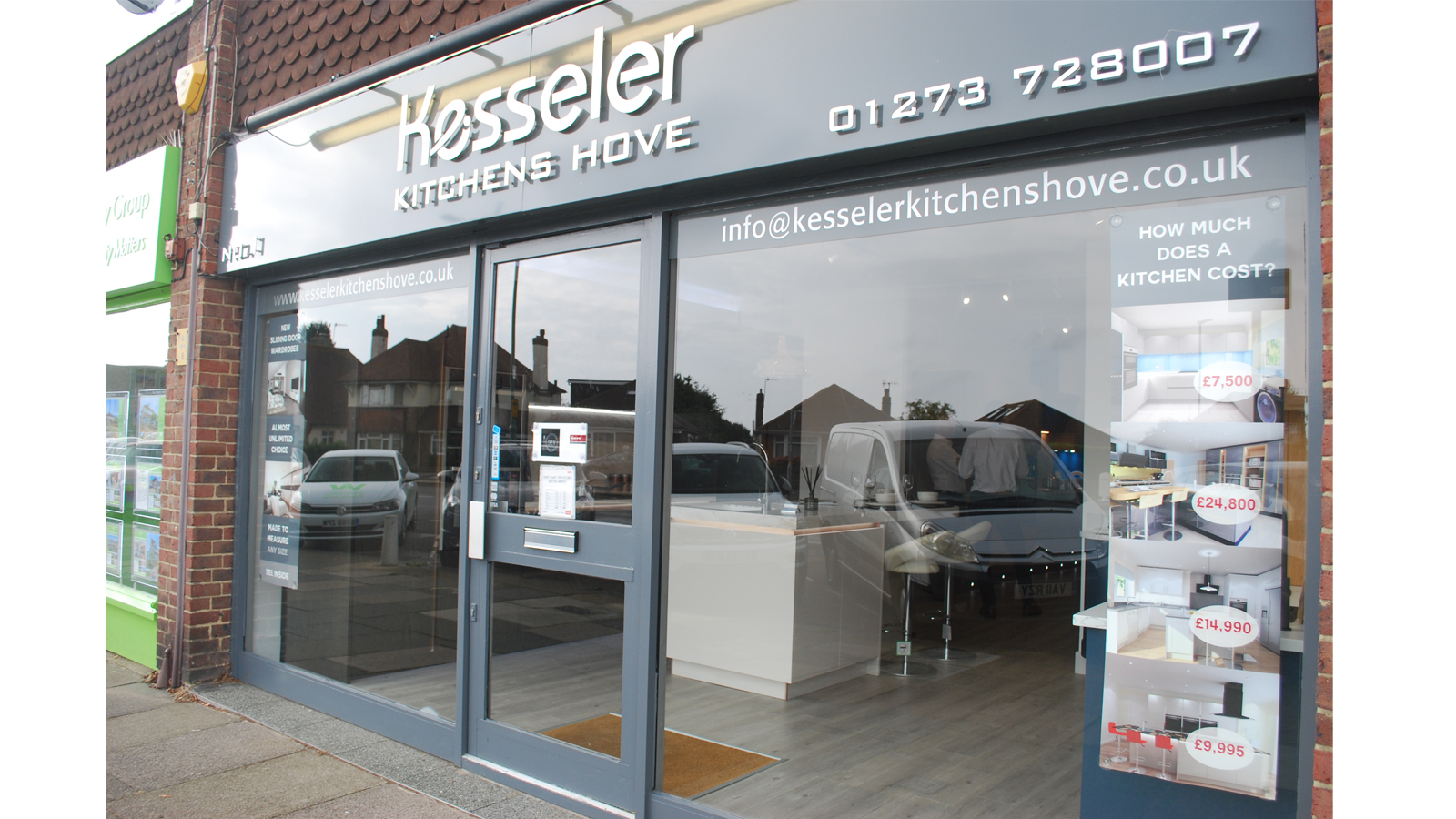
Actual kitchen installations are shown in the window with prices, around the sweet spot of £15,000-£20,000.
Sourcing suppliers
Having previously sold Dutch, German and French kitchens, what Sean wanted was “a British brand that does nearly everything the Europeans do”.
He knew of Kesseler having seen it exhibit at a kbb Birmingham exhibition but it was a visit to the company and the realisation he could enter into a partnership which helped seal the deal: “If you are a big company, in any industry, you would be working in partnership with suppliers. Kitchen showrooms don’t seem to think of that.
“Normally, when choosing suppliers, it’s what’s the cheapest, not who offers the best service, best back-up or what’s the best package – it’s only down to price. But if they all work as a team they will make more money and get better service. It is about teamwork.
“Kesseler is the first company I’ve worked with in years that has that mentality.”
The partnership has already seen the retailer ask for an infill panel to help fit dishwasher and the supplier has delivered.
And alongside Neff, Sean also chose to sell appliances by Samsung who he says, like Kesseler, has a different take on the kitchen industry: “When I was looking at appliance manufacturers – this is how naive I was – I didn’t even know Samsung did built-in appliances. It’s really high-end stuff.”
He said the company asked dealers what they may need included in the range, and have already delivered on adding to its built-in collection. “So they are listening. They are doing things differently. We’ve sold 70% Samsung and we didn’t expect that. The warranty helps and customers know the name.”
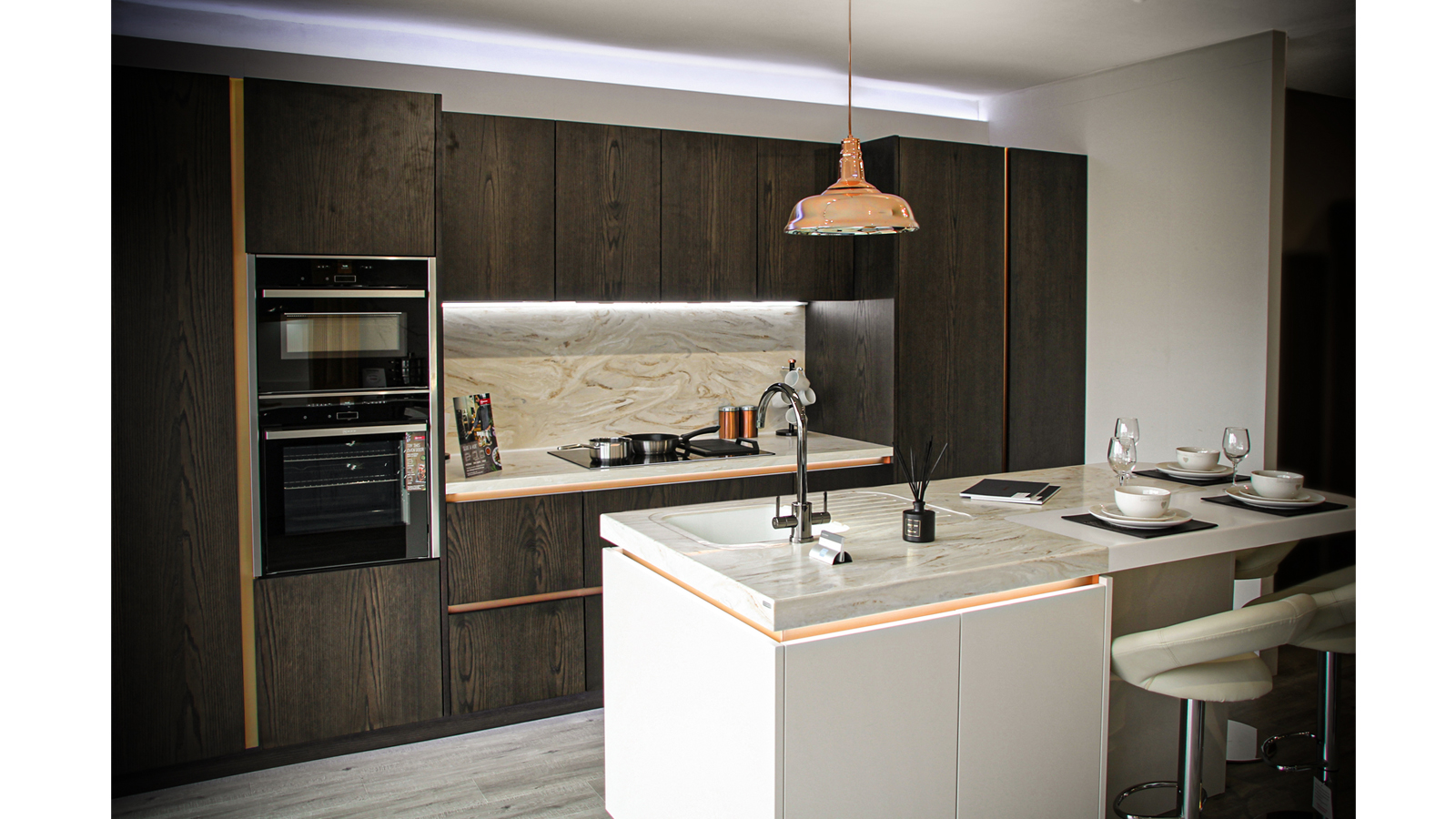
Featured at the front of the showroom is a handleless furniture design from its Vanquish collection with a copper rail, which is now the company’s best-selling finish
Quality and delivery
It wasn’t only the quality of products but the delivery times which helped seal the deal with Kesseler for Sean. “The carcase is unlike any other on the planet. The mortice tenon system, which is patented, I believe, is a solid box so there is no movement.
“The other thing is delivery. I work in a showroom and can make a mistake. I ordered the wrong sized panel. The new one was here as a bespoke, custom-made panel in three working days, delivered to site.
So from my point of view, if I fit a kitchen and find a problem – whether it’s our fault or theirs – the chances are by the time you’ve got the worktop templated, fitted and come back in, the replacement door has arrived so the job is still finished on time.”
And he points out these delivery times help him achieve a level of customer service, which is particularly important for a new business, especially when people can be inclined to complain on the internet.
In fact he says the entire industry needs to improve its delivery times. “If a customer buys from a shop which has a 7-8 week delivery, the customer perceives if there is a mistake the shop takes 7 or 8 weeks to correct it. But the industry seems to accept those delivery times and those waiting times.”
He admits: “Kitchens now are a lot more involved and suddenly a kitchen that took seven days now takes five weeks and that’s if it’s on time.
“But speed of installation – I don’t mean rushing it so it’s a bad finish – has to be key. We can fit a kitchen in less than three weeks. But, then, I’ve got a team of 10 guys who do everything.”
Sean also admits the process is efficient because he limits ordering errors in the sales process, adding: “We have a final meeting a week after the deposit has been paid, and I go through everything again with the client – every door, every colour, every handle, worktops – so I am convinced, as much as I possibly can be, that they know what they have ordered.
“When they have been to four companies and are discussing four different options, clients can suddenly say ‘I thought I mentioned that to you’. It’s picked up before we go for the order sign off.”
Sean also exclaims he can make more money selling furniture from the British manufacturer, adding: “I could have bought cheaper kitchens but with Kesseler I don’t require a warehouse. I don’t require delivery drivers as it’s sent direct to the customer’s house.
So all the money I save on that, I sell Kesseler kitchens on a lower profit margin then I would be able to sell a European brand.”
Costing out kitchens
Sean’s financial astuteness is also reflected in where he has pitched his business to capitalise on volume sales.
“Where is the 90% of the customers ? They are that £8,000-£45,000 mark.” And it is reflected in the design of his showroom, as he explains: “What I put in it’s not what I think looks flash but I think is going to sell in my marketplace.”
In fact, he is so open about the sector of the market he serves, he even features priced kitchen case studies on his showroom window.
Sean comments: ” Why can’t you show the cost of the kitchens? It’s not a secret. Customers will say no-one will tell us that and I’ll say it’s only a rough estimate because I’ve not seen your plans. It’s a different attitude.”
Interestingly, however, he never asks a client their budget “They won’t tell the truth anyway.
“I always say if I put in things that are too dear, I can take it up or put it down. I can tell you the price of everything individually. If I think something is good and you haven’t mentioned it, I’ll put it in and if you don’t like it I won’t be offended.
“It’s a partnership to work together to get the best balance for what you want. ”
He exclaimed after a presentation ” a customer jokingly said what do I do now? I said you have three choices – you can either give me some money, you can think about it or you can say ‘ thank you it’s not for us goodbye’.
“And he laughed and said ‘no, we want to buy it’. When you tell someone the options it’s no longer a secret and they are less likely not to take it.”
And certainly, it is paying off, as Sean explains: “We sold 13 kitchens in the first three months we opened. We sold six in one month. We are way ahead of where we thought we would be – up 40%.
“A lot of showrooms try to work on one or two or month, which is ridiculous. Either they’re overpriced, which can be half the problem, or the retailers are just not proactive.”
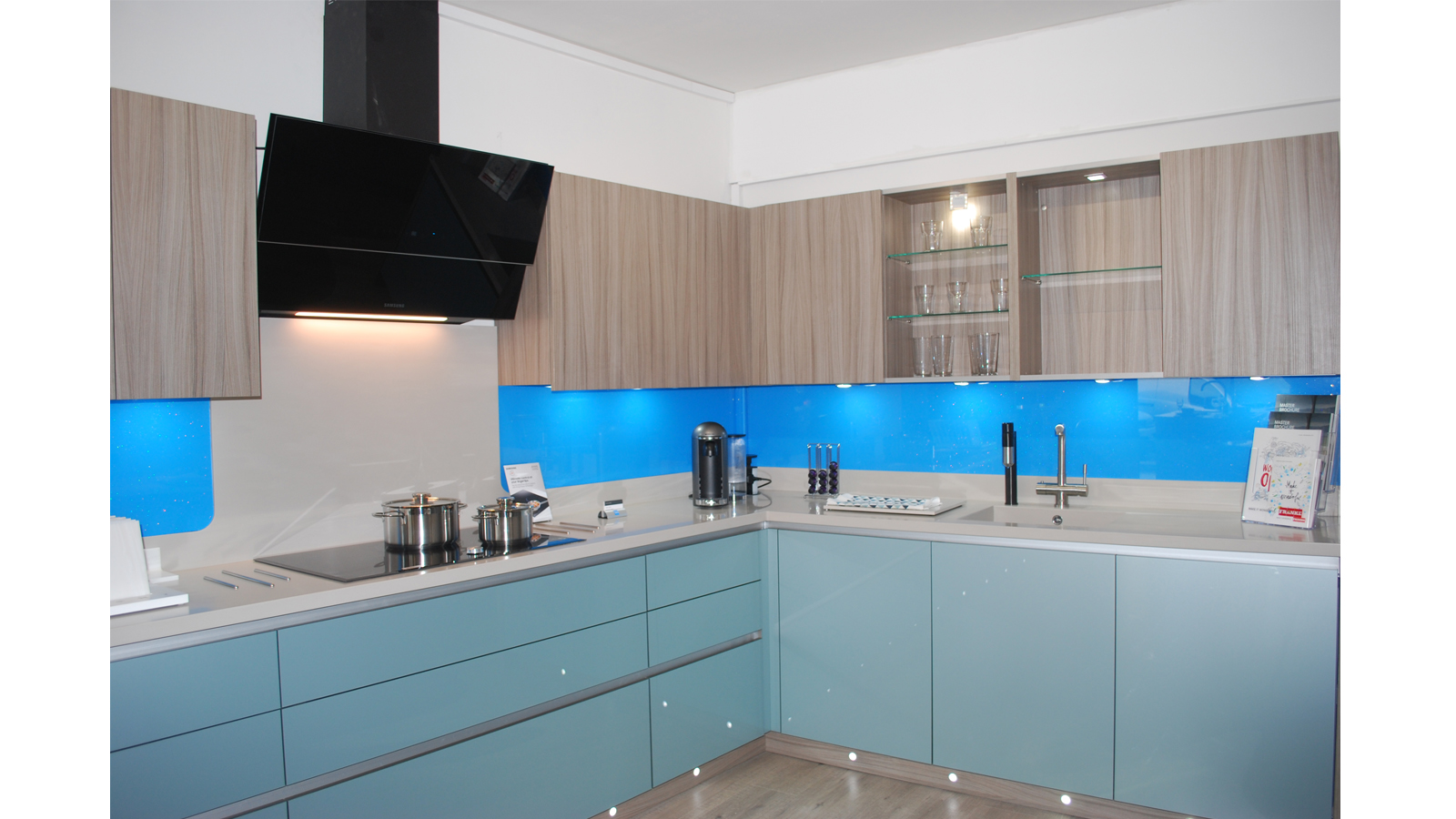
At the rear of the showroom are more moderately priced versions of the window displays, with a cost-effective handleless collection on display.
Adopting the brand
It’s not an accusation that can be levelled at Sean who asked Kesseler if he could use its name for his business branding and even made sure the signage was installed prior to opening.
He explains why: “When you start a new showroom, the difficulty can be for people who want to place a deposit is that you’ve not got any history or back-up.
“The sign was put up five weeks before we opened. There was a poster in the window that was Kesseler-branded stating ‘kitchens coming soon’ and prospective clients could Google Kesseler to find out more.”
But isn’t it a risk getting into bed with one brand?
Sean says not only does it mean he is offered a large, protected area but dealing with limited suppliers ensures he delivers top-level service: “if I have four brands I’m going to confuse myself which one to show people.
“Secondly I’m going to make more mistakes ordering from different companies, who use different units.
“If you have one brand, you will learn it well. You will know what you can and can’t do. You’ll make less mistakes and build up a better relationship with the manufacturer.”
And he exclaims the kitchen industry can learn from car showrooms, which are all branded dealerships.
He adds just like the dealerships: “I have free tea, coffee, orange juice. I have free customer Wi-Fi. Kids can come in here, log onto the system and play with their iPads. It’s all customer experience.
“Why do people still go to a shop? If they can get a better experience in a shop they will still go to a shop.”
And Sean is already thinking ahead about how he can further his showroom and also plans to follow the boating industry to focus on lighting, adding: ” You have to think ahead – what is the next thing that other companies aren’t doing. What are they not going to do or do late?”
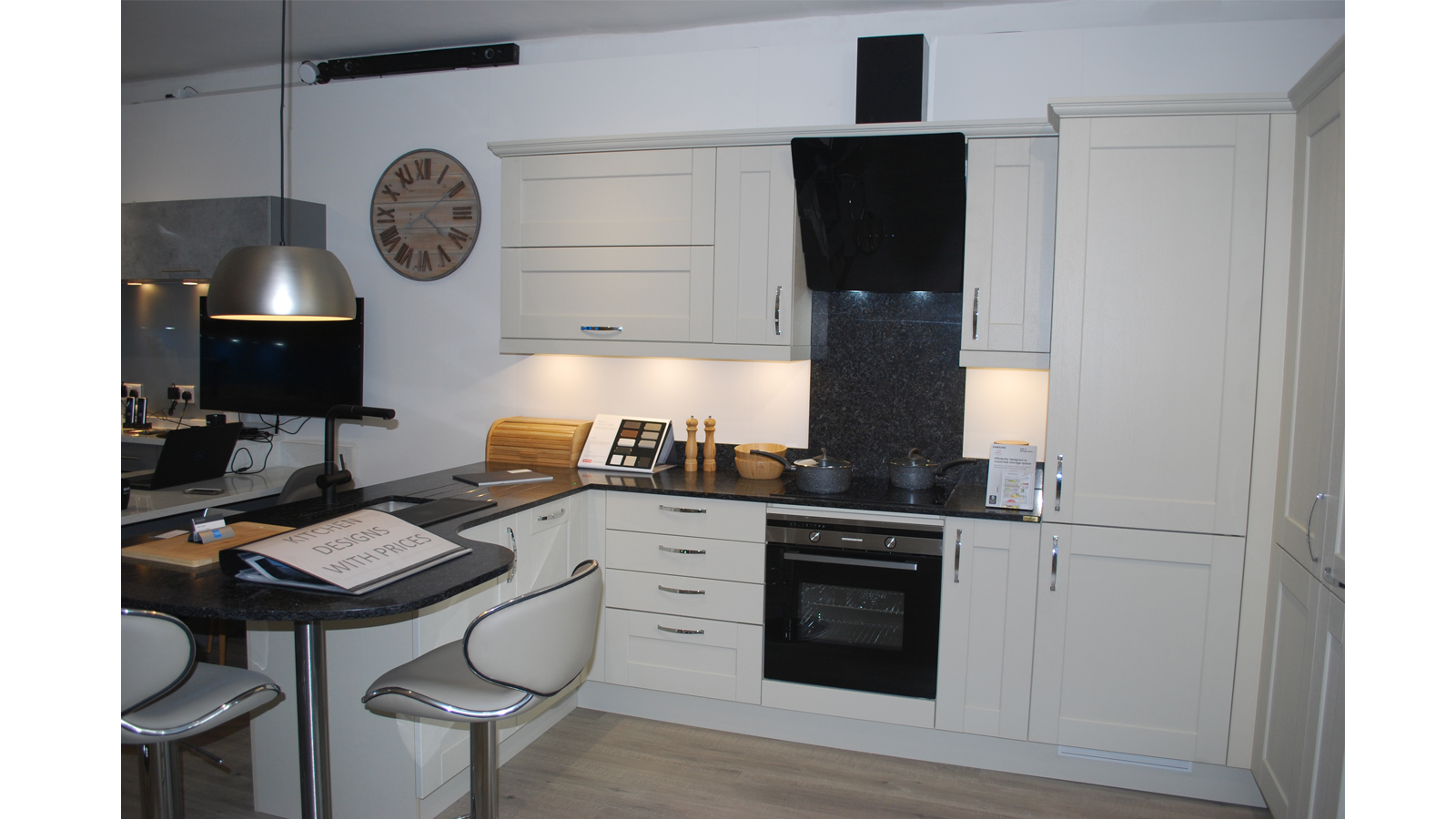
Completing the four-strong showroom displays is a lower-priced Shaker in a foil wrap, as an alternative to the painted solid timber
Future vision
Such is Sean’s vision about the future of retailing; it has already earned him an inaugural Samsung Kitchen Circle Award, scooping the Showroom category for the South.
So what advice could he offer the kitchen industry and share with retailers?
He implores suppliers and retailers to have a focus on service, concluding: “The biggest takeaway for the industry is to lose some of its arrogance and start thinking about what we can learn for the future. What can we embrace?
“Retailers can learn so much together but we’ve got to stop fighting each other. I think we can all help each other.”



